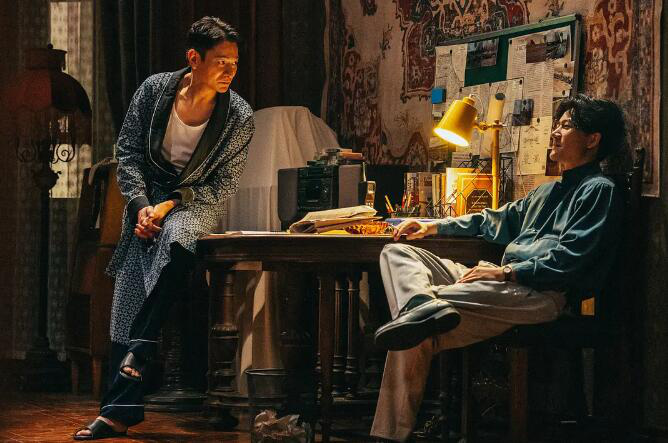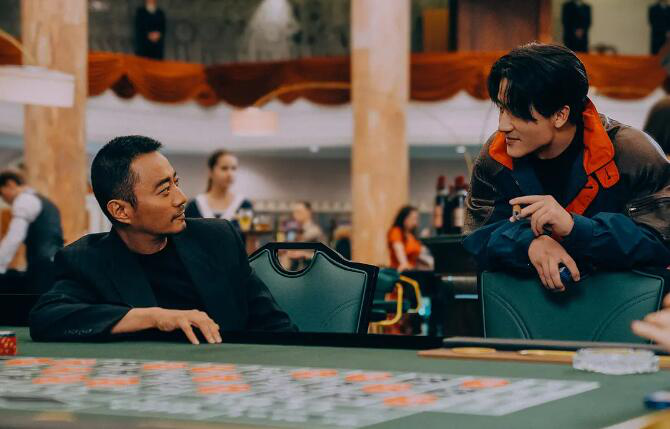Original title: The violence and gentleness of Hong Kong gangster movies

After that, the third work of "National Action" series finally appeared. This work is directed by, which embodies its unique film style. They are both commercial action blockbusters with the main theme, and the film styles of Qiu Litao and Lin Chaoxian are different. In the dimension of commercialization of the main theme, Qiu Litao echoes the image tradition of Hong Kong gangster movies in the past.
"Moscow Action" embodies the "constant" and "change" of Hong Kong gangster movies. On the one hand, like most gangster movies, the main characters in Operation Moscow are divided into two groups: law enforcers and criminals. Their fierce confrontation constitutes the main driving force of the film. However, it is quite disappointing that the performance of "Moscow Action" is relatively mediocre: it is still a gap that relies on internal struggles between criminals to cause contradictions and make law enforcement break through. This kind of bridge can be described as a typical plot design of Hong Kong gangster movies, and there is nothing new. On the other hand, the traditional Hong Kong gangster movies focus on the confrontation between right and evil, mainly seeking new changes in the types of crime movies. However, Action in Moscow belongs to the main melody sequence and aims to present wonders through action drama. How to strike a balance between commercial crime action movies and main melody movies and complete the meaning construction in them is an ideological task that directors must face directly.
Here, Qiu Litao shows his narrative ambition through the creation of political metaphor. Setting political metaphors in movies has long been Qiu Litao’s spiritual characteristic that can’t be ignored in his image style. This "Moscow Action" is no exception. Whether in Southeast Asia or the Soviet Union, their significance to gangster movies actually points to the same kind of geopolitics, that is, hybridity and marginalization. Only in the mixed fringe, the disorder and madness of gangster stories have the soil to happen. More importantly, only in such an environment can the metaphor system have its operating space, and further make the film open a pluralistic and free interpretation space.

For example, in the opposition between good and evil in Moscow Action, Qiu Litao deliberately played down, canceled and even reversed the moral judgment. Comparing the positive and negative characters in the film, we can find that gangsters have more arc lights than the police. Although Qiu Litao’s weakness has always been that he can never put his mind on the meticulous carving of the characters, his vivid portrayal of the spectacle has attracted the greatest attention. Therefore, it is difficult for us to see real and concrete people in Qiu Litao’s films, but only "tool people" who are dedicated to promoting the plot and are quite facelift. This is particularly evident in the police played by. It is difficult for the audience to find any distinctive human expression in this role. Compared with the police, gangsters actually show more abundant human nature. For example, Miao Qingshan, played by Miao Qingshan, has a tragic life core, and his unruly personality and perverse temperament make this character show a relatively flesh-and-blood side. The poor spiritual world of the positive characters is in sharp contrast with the rich soul space of the negative characters, from which we can see Qiu Litao’s ambiguous views on human nature, morality and rule of law. Moreover, in the process of plot advancement, Miao Qingshan used Vassili’s daughter, who missed him day and night, as bait to threaten Vassili to obey his orders. Vasily agreed to cooperate with the police because he was promised to see his daughter smoothly. Here, the film points out through Miao Qingshan that although the power has shifted, the daughter is still a "chip" in a sense.This reflects Qiu Litao’s thinking on power: no matter what changes have taken place in the face of power, as long as the operating mechanism of power remains unchanged, the discipline of power will continue.
In addition, Moscow Action sets the time and space background on the Sino-Russian border in the early 1990s. This is a magnificent era. Chinese mainland’s economic development grew like grass, while Russia was in a chaotic state similar to anarchy. From the music selection and scene design of the film, we can see Qiu Litao’s infinite infatuation and creative passion for this historical transition and vigorous and vivid era. First of all, music, as a symbol of the times, has played a vital role in the film. The film selected songs such as "Ashamed" and "Don’t Break My Heart", which shows the director’s enthusiasm for Chinese mainland’s rock music in the 1990s. As for the potential musical texts, it obviously includes but is not limited to A Red Cloth. Secondly, the time and space of the story — — The Sino-Russian border in 1993 pointed not to a specific space, but to a historical background with marginal and mixed attributes. For this historical background, Qiu Litao did not devote himself to restoration, instead, he replaced the style of the times with retro Hong Kong style, which undoubtedly showed the combination and dislocation of Hong Kong-style aesthetics and China’s historical consciousness. The culture and politics behind it are obviously meaningful. Neo-historicism tells us that any historical writing can’t reach history itself, but it must be a re-creation. In this sense, "Moscow Action" is nothing more than a historical restatement with strong subjectivity.It reflects Qiu Litao’s experience category, historical consciousness, aesthetic taste and his position in the current co-production era.
Although Action in Moscow has many unsatisfactory aspects, its flaws are not hidden. It puts the typical characteristics of Hong Kong gangster movies into the main theme commercial blockbuster, which not only shows violence, but also has a gentle side. For example, the emotional concentration behind emotion and righteousness is moving. However, this tenderness mostly refers to the ties and friendship between men, and the premise of forming a strong alliance between men is often to exclude women from the power structure. Therefore, misogyny can be seen everywhere in a series of Hong Kong gangster movies. In these films, women are often deceived, damaged and sacrificed, and their faces are usually vague and their personalities are often weak. Sedgwick mentioned in Between Men that women are always regarded as natural passive objects in narrative works with men as the narrative subject and men’s friendship as the main clue. On the one hand, it maintains the rule of patriarchy, on the other hand, it reveals the admiration and even secret love of this kind of narrative works for masculinity, and then constructs an aesthetics dominated by masculinity. In this aesthetics, women are doomed to be excluded. "Men are like brothers and women are like clothes" is a typical presentation. The love between Miao Qingshan and Miao Ziwen in Moscow Action is stronger than gold, and a woman’s "sacrifice" must be used as the test mechanism — — Miao Qingshan raped his girlfriend in order to make Miao Ziwen break the roots; Miao Ziwen later killed his beloved girlfriend.Just to complete the ideological revolution and emotional conversion to Miao Qingshan. From this perspective, the rather tender side of these gangster films is actually full of violent factors. Even so, in the sequence of commercial blockbuster, Qiu Litao’s film formula is still very attractive. His thinking on power discourse, irony on power operation mechanism and resistance to power discipline all make his main theme image style present a fresh breath and allegorical characteristics. (Author: Lai Xiuyu)
关于作者